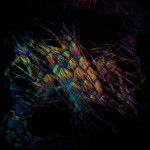Kayo Dot : Blasphemy

It is a benefit to Kayo Dot that none of their albums are particularly crafted to be listenable or enjoyed. On its surface it would appear that this is a critique, a statement of seemingly deliberate oblique motion meant more to shirk listeners than draw them in, but this would be inaccurate; instead, the group seems perfectly sincere and self-guided at every moment. The group takes left turns even from themselves release after release, shirking everything save for a generalized gothic air and tendency toward the avant-garde, but modes that find no steady material ground album to album. As a result, there’s never a sense that they are trend-chasing, never a sense that they are condescending to audiences or trying to rile them up with out-there sounds and ideas. It’s more pure than that. It sounds like Kayo Dot pursuing themselves, regardless of audience expectations or desires. This is their buoy in times of trouble like their previous record Plastic House on Base of Sky or the much earlier Blue Lambency Downward. In both instances the conceptual thrust of the record was there but the material wasn’t quite developed enough, in the former case introducing new ideas before they seemed ready and in the latter holding on to older conceptual forms after they’d been fully mined.
In terms of sonic placement, Blasphemy keeps with the second phase of their career started with fourth LP Coyote, building itself off of nervy post-punk and gothic rock extended into regions avant-garde via jazz-fusion and prog movements. This time the group reincorporates the clearer synth pop and experimental electronica motives of previous LP Plastic House on Base of Sky, finding those elements more cleverly balanced against the stark harsh-angled gothic music. Much of the album feels like German expressionist cinema, all strange angles and grey gradients and brutalist geometry. Color sparks and then departs; forms cohere briefly before dissolving into a dissembling snarls of notes. It is a challenging listen, certainly, with the backbones of songs largely buried, unearthing themselves only after several listens. But the challenge here feels once more to be a fruitful one, offering a colder and more alien sense to the core conceptual thrust of Kayo Dot.
It’s hard to tell whether it is a strength or a weakness that Blasphemy feels like another of Kayo Dot’s loose approximations of former group maudlin of the Well’s more abstract methodology. There were lingering fragments of that mode on the first few Kayo Dot records, before the groups separate modus operandi revealed itself over time, only for Hubardo years later to once more feel closer to that older group than to the one that actually produced it. The affect in question is a level of abstraction, a sidewise drift of modulations and chord substitutions that is much less linear and discretely tuneful than Kayo Dot typically use. That was one of the biggest changes between the two groups, with motW feeling substantially more psychedelic while even in the occassional freeform of Kayo Dot the ideas felt more concretely connected than moving from one to another by dream logic. Blasphemy recovers this other mode of composition, connecting occasionally wildly different ideas through the loose approximations of thoughts found in dream, form melting into form endlessly and seemingly without reason.
This is a strength in that it gives a remarkable depth to the material. Half of the fun of these types of records is learning not just which part follows what but slowly assembling the motive behind them, something the composers themselves are not even consciously aware of when following the internal direction the music seems to tug them toward. But this leads to the obvious weakness which is the level of challenge this presents to a listener. The material on Blasphemy is both tuneful enough to compel the ear to find reason in the moments of disharmony, chaos and confusion while also being just tuneful enough to make those moments so much more frustrating. It wasn’t on the first or even fifth listen that everything started to assemble itself (a sign of a good prog/experimental/avant-garde record) and while for listeners who are enamored with this kind of music for precisely its ability to resist easily peering into the spinning wheels, it will likely find the group written off again by listeners less compelled by this level of adventurousness.
And that’s a shame. Because not only is Toby Driver one of the better composers in the past twenty years and Kayo Dot one of the most consistently intriguing bands, compelling even when the experiment falters or fails due to the ambition of their forms and keenness of sonic details, but Blasphemy is one of the better records of the group’s second half. It may not beat out Coyote as the best of their discretely goth period, but it offers serious challenge to Coffins on Io as an experimental jazz-fusion take on darkwave and goth and easily overcomes Gamma Knife and Stained Glass. There’s something about the way Kayo Dot pursue themselves that feels so much more unapproachable than similar avant-goth artists like Algiers, a group that have found deep (and well-earned) critical acclaim by trucking in material motivated in similar manners, pointing itself sonically at the avant-garde emboldened by a political pulse. But Kayo Dot always seems to be shortshrifted by certain critics of certain institutions, who so rarely seem to know what to do with a group that would be more at home among peers like Magma, Thinking Plague and Univers Zero than more hip (but no less good) experimental and progressive bands. It’s not unlike the Pyramids’ album A Northern Meadow, a masterpiece of the contemporary avant-garde that proved too challenging for some even nominally devoted to this kind of music. Let it be known: Blasphemy is one of the best pieces of avant-garde music in recent memory, comparable to the lushness of Lonnie Hollie’s immaculate MITH, and well-deserving of time and attention needed to unravel the labyrinth of its thorns.
Similar Albums:
 Toby Driver – They Are the Shield
Toby Driver – They Are the Shield
 Vaura – Sables
Vaura – Sables
 Virus – Memento Collider
Virus – Memento Collider
Langdon Hickman is listening to progressive rock and death metal. He currently resides in Virginia with his partner and their two pets.

